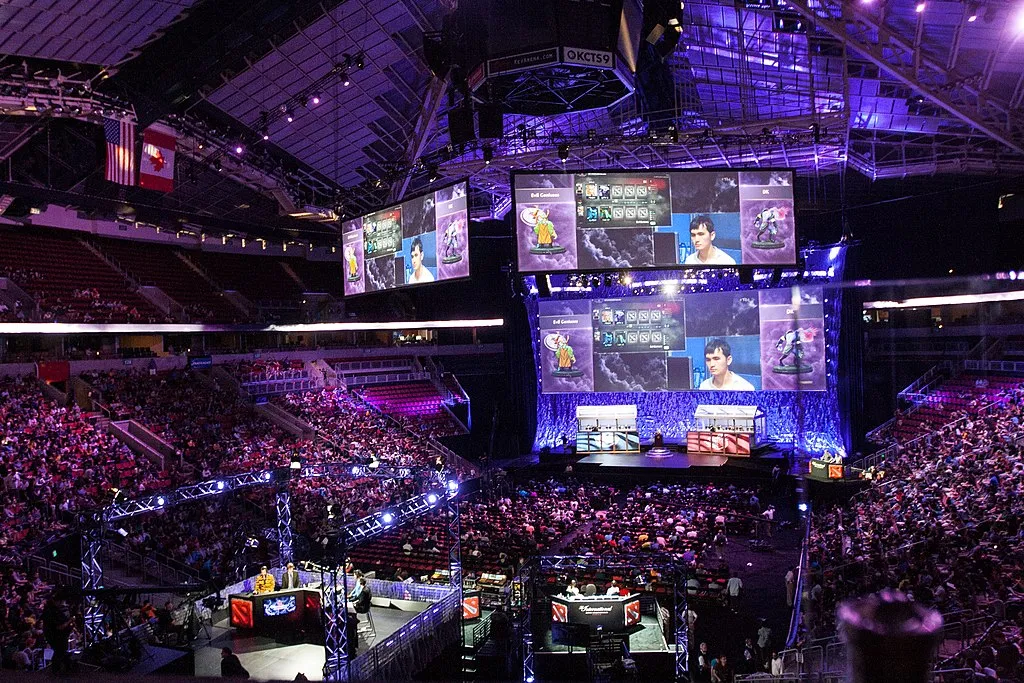The world of gaming has witnessed a remarkable transformation in recent years with the emergence of E-sports. Competitive gaming has evolved from local competitions to global tournaments, captivating millions of fans worldwide. This article explores the evolution of E-sports and delves into the profound impact it has had on the gaming industry, economy, and society at large.

Photo Credit: Wikimedia Commons
Introduction
In recent years, the world has witnessed a remarkable evolution in the realm of gaming, giving birth to a new phenomenon known as electronic sports or E-sports. E-sports refers to competitive video gaming, where professional gamers compete against each other in organized tournaments. This article delves into the evolution of E-sports and explores the global impact of competitive gaming.
The Emergence of E-Sports
The roots of E-sports can be traced back to the late 20th century when video game enthusiasts began organizing local competitions and gatherings. However, it was the advent of high-speed internet and advancements in technology that paved the way for the growth of E-sports on a global scale. With the rise of multiplayer online games and the ability to connect with players from all over the world, competitive gaming started gaining traction.
Riot Games reveals “Virtual Pass” for LoL Worlds 2023 with digital and physical products
— Valorant News (@ValorINTEL) April 19, 2023
John Needham, President of Esports at Riot Games revealed that a new product is launching for fans to purchase at Worlds 2022 and the VALORANT Champions Tour next year.
The product is a… pic.twitter.com/tT9Ig1dBIK
The Growth and Global Reach of Competitive Gaming
Over the years, E-sports has experienced exponential growth, attracting a massive global audience. Major tournaments now fill stadiums and arenas, with millions of fans watching the action online. E-sports has transcended geographical boundaries, becoming a truly global phenomenon. The accessibility of gaming platforms and the proliferation of streaming services have contributed to the widespread popularity of E-sports.
Impact on the Gaming Industry
The rise of E-sports has had a profound impact on the gaming industry. Game developers and publishers now focus not only on creating immersive gameplay experiences but also on designing games with competitive aspects in mind. E-sports has influenced game design, leading to the development of titles specifically tailored for competitive play. This shift has transformed the industry, making e-sports an integral part of game development strategies.
The time has come!
— Fortnite Competitive (@FNCompetitive) June 9, 2023
😎 New FNCS dates
🔷 Rank requirements
🎮 PlayStation Cup
…and MORE!
Read the C4S3 Competitive blog: https://t.co/OUxvfJDAYP pic.twitter.com/WizE5X4uyj
Economic Influence of E-Sports
E-sports has emerged as a lucrative industry, with substantial economic influence. The growing audience base and the rise of sponsorship deals have attracted investments from major brands and organizations. Prize pools for e-sports tournaments have reached unprecedented levels, offering substantial financial rewards to winning teams and players. Moreover, the E-sports ecosystem has created numerous job opportunities, ranging from professional players to coaches, commentators, and event organizers.
Social and Cultural Impact
E-sports has had a significant social and cultural impact, bringing together people from diverse backgrounds who share a common passion for gaming. Competitive gaming has created vibrant communities and subcultures, fostering camaraderie and connection among players. E-sports events have become social gatherings where enthusiasts gather to celebrate their shared interests. Additionally, E-sports has challenged traditional notions of sports, expanding the definition to include virtual competitions.

Esports has also opened up new employment paths. Professional gamers are now paid well, and esports companies have established infrastructure to assist its athletes, including training facilities, coaches, and support personnel. Careers in shout-casting, coaching, administration, and content creation have evolved in addition to playing, providing a variety of options for gamers.
Evolution of E-Sports Tournaments
E-sports tournaments have undergone a remarkable evolution, transforming from small-scale events to large-scale spectacles. Initially, tournaments were organized locally, with limited participants. However, as E-sports gained popularity, tournaments began to adopt a more professional and structured approach. Today, international tournaments attract the best players from around the globe, offering substantial prize money and media coverage.
Technological Advancements
Technological advancements have played a pivotal role in the evolution of E-sports. The development of high-performance gaming equipment, such as powerful graphics cards and responsive peripherals, has elevated the gaming experience to new heights. Additionally, advancements in streaming technology have made it easier for fans to watch E-sports competitions in real-time, further fueling the growth of the industry.
2023 is YOUR year!
— Fortnite Competitive (@FNCompetitive) January 11, 2023
🏆 New "Major" structure
💰 A $10,000,000 total prize pool
📆 FNCS dates
And an in-person LAN tournament in Copenhagen, Denmark – FNCS Global Championship 2023!
More details in our blog: https://t.co/U4ARpRzGz9 pic.twitter.com/ZqXOkkODWP
The Role of Webcasting/On Demand Platforms
Webcasting platforms have revolutionized the way E-sports are consumed and have contributed significantly to its popularity. Platforms like Twitch and YouTube allow gamers to stream their gameplay and connect with audiences worldwide. These platforms have created a space for aspiring gamers to showcase their skills and build a dedicated fan base. Furthermore, webcasting has become a viable career option for many gamers, with top webcasters amassing millions of followers.
Challenges and Controversies
While E-sports continues to thrive, it faces its fair share of challenges and controversies. Issues such as doping, cheating, and match-fixing have plagued the industry, highlighting the need for regulations and integrity measures. Additionally, the high-pressure nature of professional gaming can have adverse effects on players’ mental and physical health. Striking a balance between competition and player well-being remains a significant challenge for the E-sports community.
Future Prospects and Trends
Looking ahead, the future of E-sports appears bright. The continued advancements in technology, including virtual reality and augmented reality, hold the potential to enhance the gaming experience and open new avenues for E-sports. The integration of E-sports into traditional sports events and the inclusion of E-sports in major multi-sport competitions further validate its global significance. Moreover, the growing interest from mainstream media and the increasing investment in E-sports infrastructure indicate a promising future for the industry.
New 'Kraven the Hunter' red band trailerpic.twitter.com/kBKGQUizpV
— ScreenTime (@screentime) June 19, 2023
Conclusion
The evolution of E-sports has transformed competitive gaming into a global phenomenon, captivating millions of fans worldwide. With its economic influence, social impact, and technological advancements, E-sports has reshaped the gaming industry and challenged traditional notions of sports. As the industry continues to grow and overcome challenges, E-sports is poised to remain a prominent force in the entertainment landscape.
FAQs
1. What is E-sports?
E-sports refers to competitive video gaming, where professional gamers compete against each other in organized tournaments.
2. How has e-sports impacted the gaming industry?
E-sports has influenced game design and transformed the industry, making competitive gaming an integral part of game development strategies.
3. What is the economic influence of E-sports?
E-sports has emerged as a lucrative industry, attracting investments from major brands and organizations, and offering substantial financial rewards to winning teams and players.
4. What is the social and cultural impact of E-sports?
E-sports has created vibrant communities and subcultures, bringing together people from diverse backgrounds who share a common passion for gaming.
5. What are the future prospects and trends in E-sports?
The future of e-sports looks promising, with advancements in technology, integration into traditional sports events, and increasing investment indicating continued growth and relevance.
Stay connected with Today On Globe for the latest Global Issues and News Updates.
Explore more related articles at [TOG News / TOG Article]













